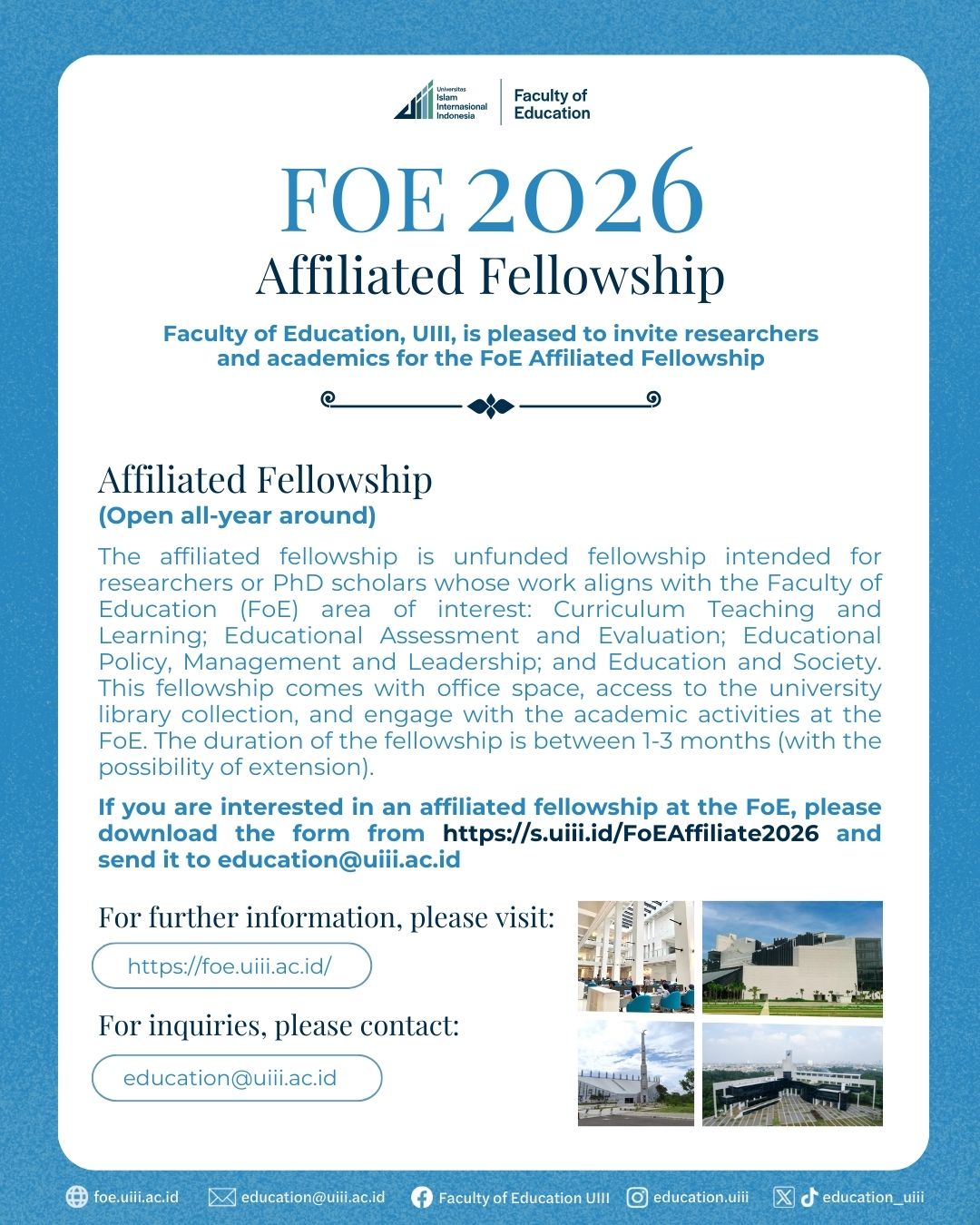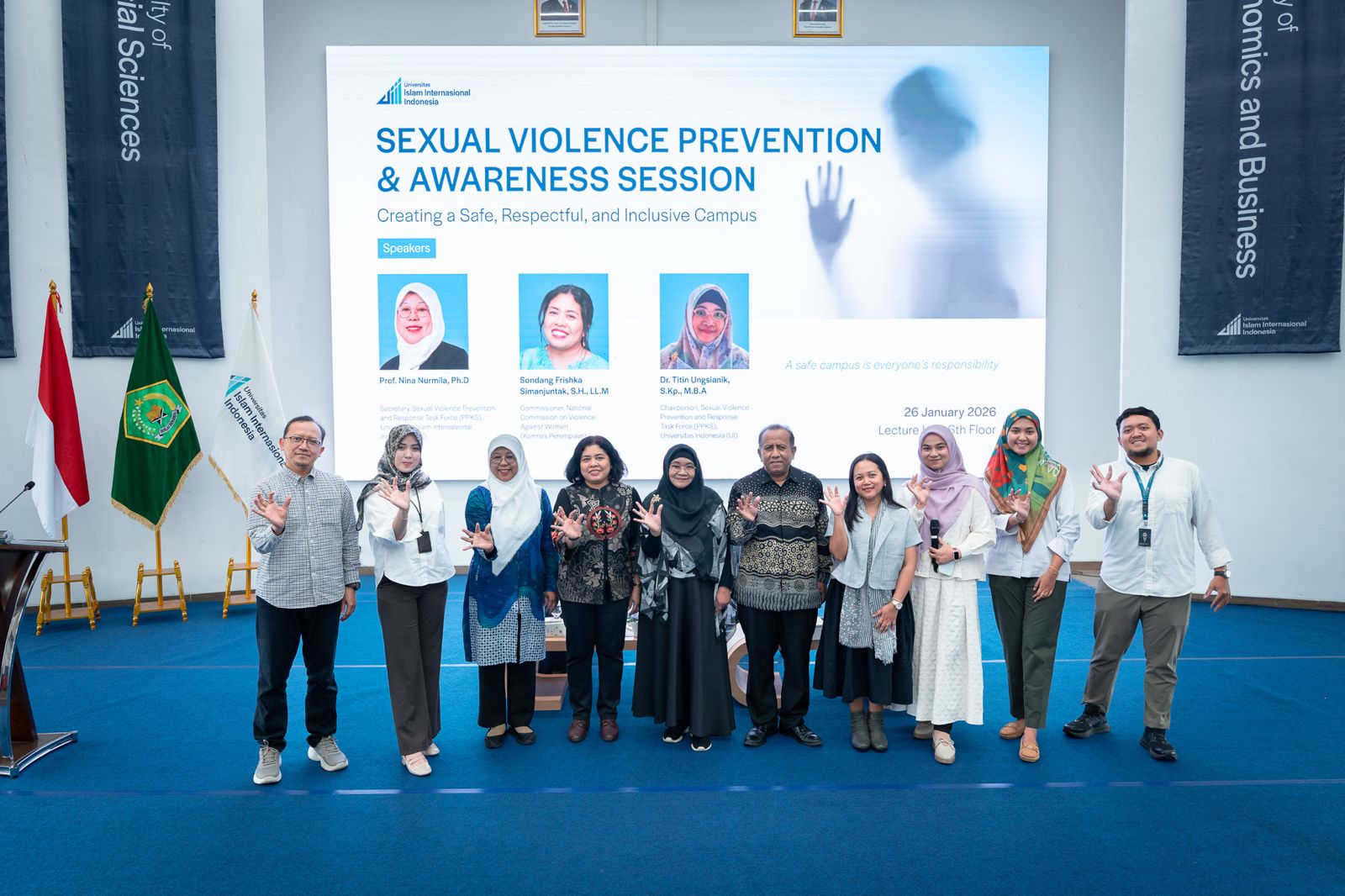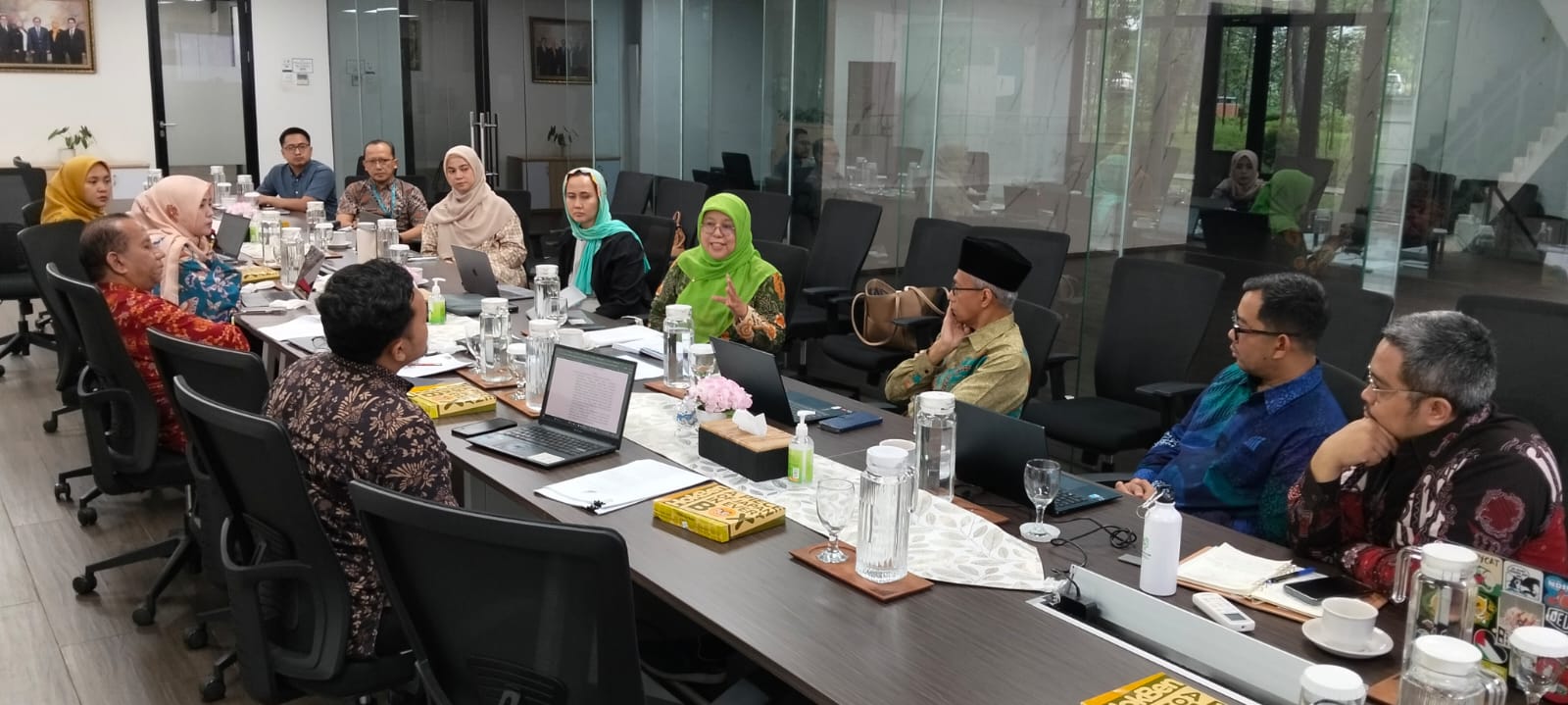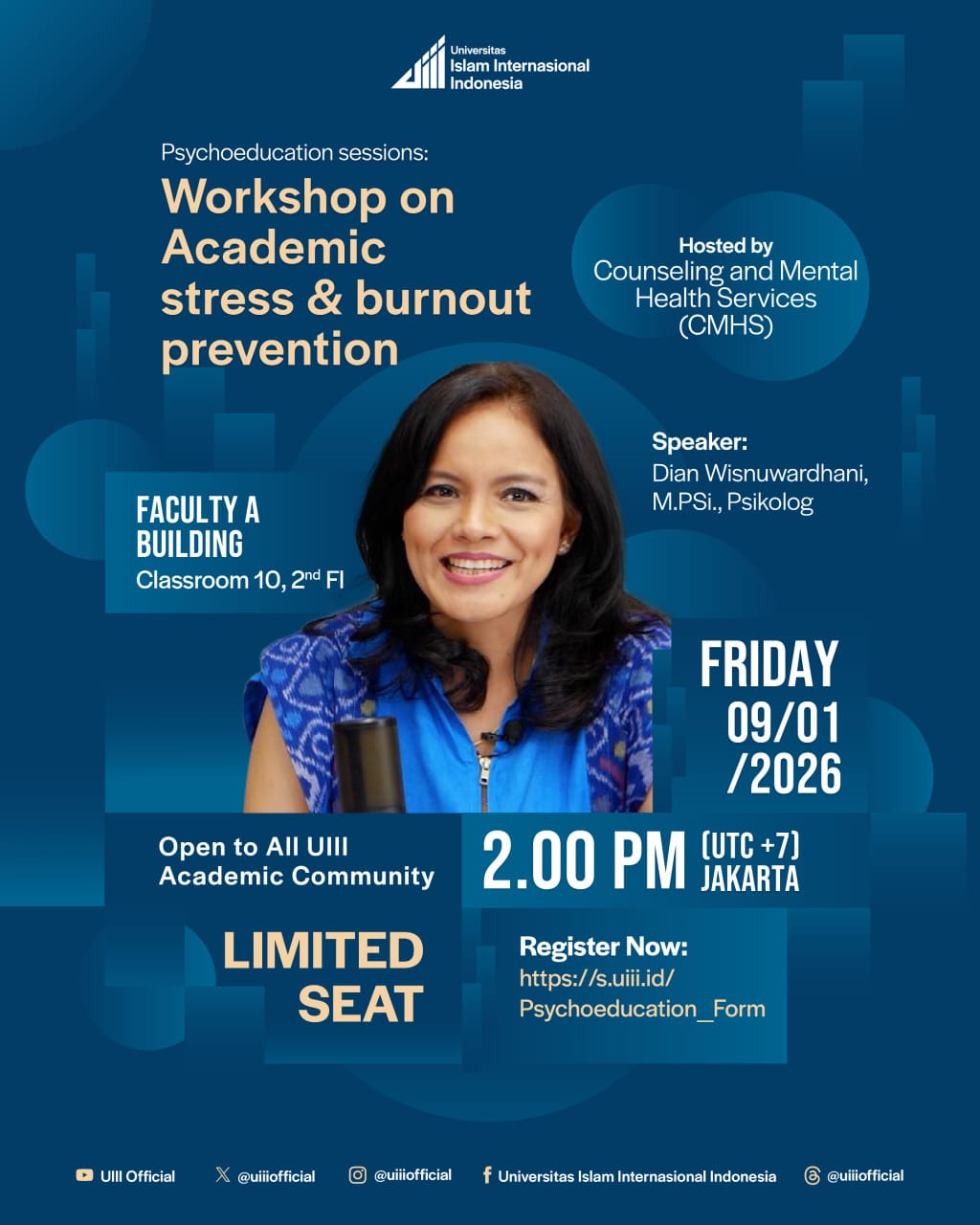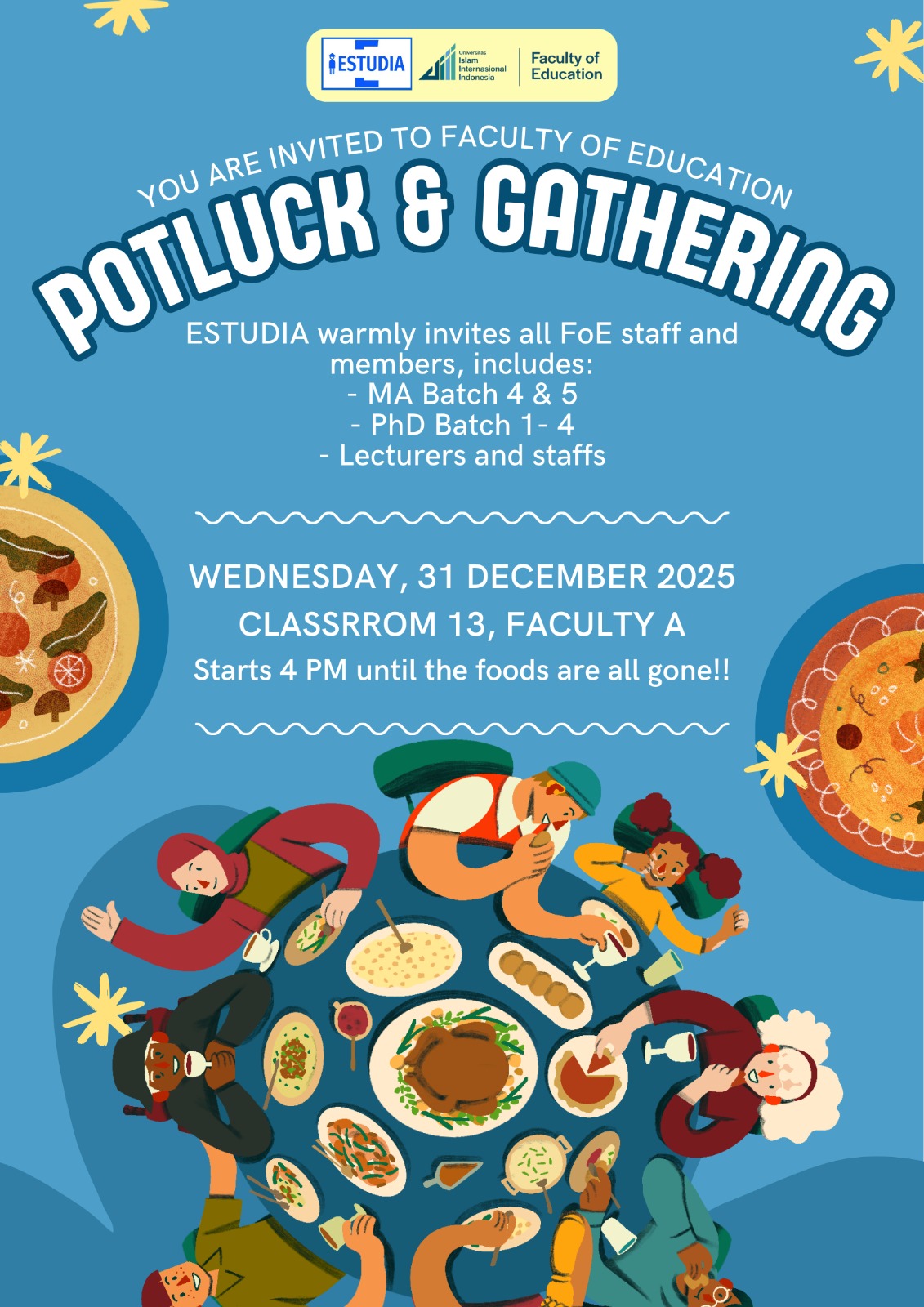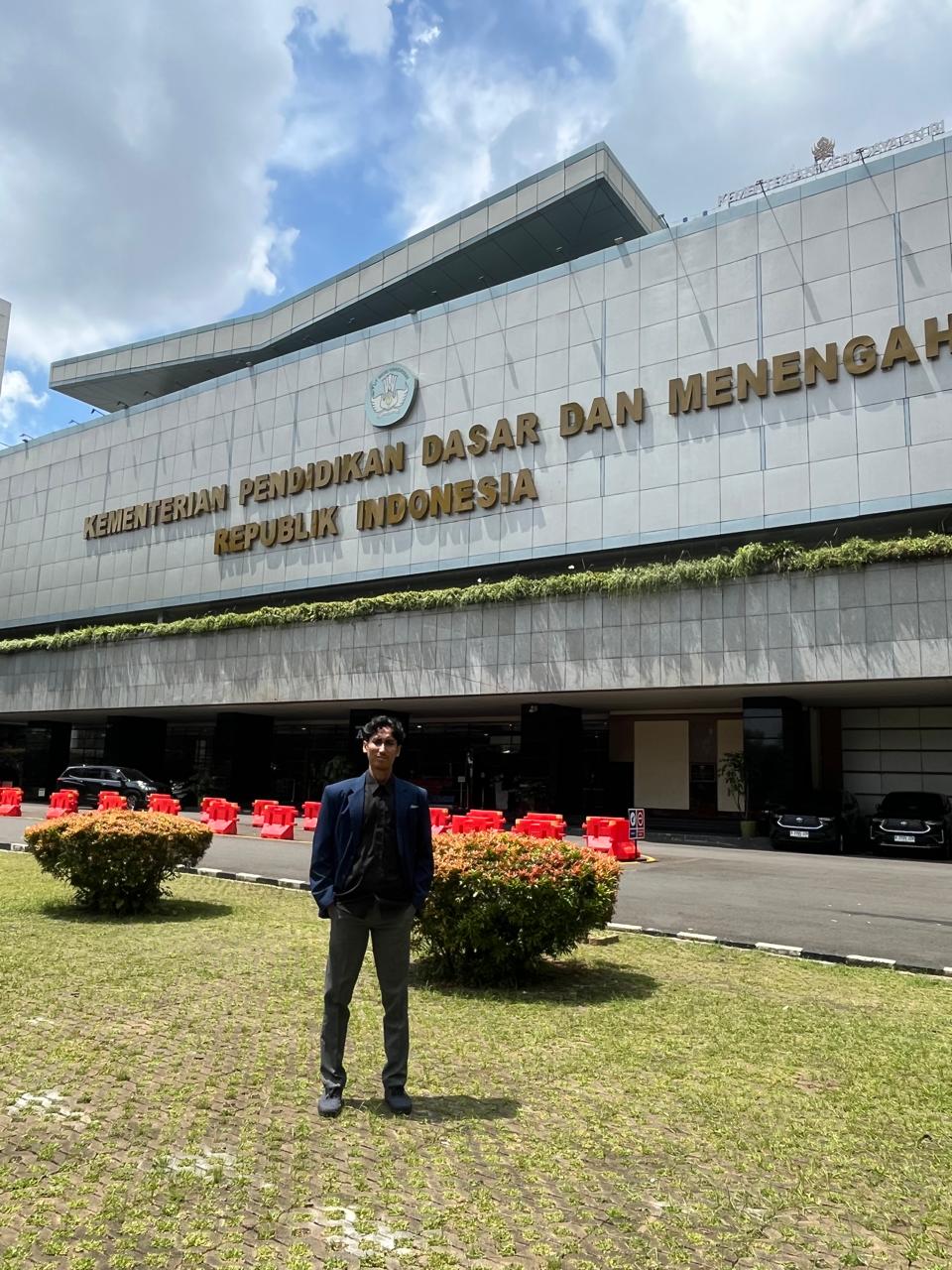Faculty of Education 2026 Affiliated Fellowships ✨

Faculty of Education, UIII is pleased to invite researchers and academics for the FoE Affiliated Fellowships ✨
Affiliated Fellowship
(Open all-year around)
The affiliated fellowship is unfunded fellowship intended for researchers or PhD scholars whose work aligns with the Faculty of Education (FoE) area of interest: Curriculum Teaching and Learning; Educational Assessment and Evaluation; Educational Policy, Management and Leadership; and Education and Society. This fellowship comes with office space, access to the university library collection, and engage with the academic activities at the FoE. The duration of the fellowship is between 1-3 months (with the possibility of extension).
If you are interested in an affiliated fellowship at the FoE, please download the form from https://s.uiii.id/FoEAffiliate2026 and send it to education@uiii.ac.id
For further information, please visit: https://foe.uiii.ac.id/
For inquiries, please contact: education@uiii.ac.id
UIII Takes the Front Line in Combating Sexual Violence on Campus

UIII Takes the Front Line in Combating Sexual Violence on Campus
January 26, 2026
By Supriyono | Photo: Achmad Jatnika
Universitas Islam Internasional Indonesia (UIII) reaffirmed its commitment to creating a safe, respectful, and inclusive academic environment by hosting a Sexual Violence Prevention and Awareness Session on 26 January 2026. It reflected UIII’s proactive approach to preventing and addressing sexual violence through institutional regulations, awareness-building, and survivor-centered responses.
Attended by students, university leaders, faculty members, and staff, the forum emphasized that sexual violence is not merely an individual issue but a structural challenge that must be addressed through firm policies and a culture of accountability within universities.
Secretary of UIII’s Sexual Violence Prevention and Response Task Force (PPKS), Prof. Nina Nurmila, PhD, stressed that sexual violence on campus is often silenced or even justified in the name of culture, family honour, or institutional reputation, an issue that persists in many countries.
“In many parts of the world, sexual violence is still ignored or protected under the pretext of tradition, family reputation, or institutional image. This culture of silence must be addressed. At UIII, we are committed to ensuring that sexual violence is never normalized or hidden,” said Prof. Nina.

She emphasized that UIII has established clear regulations and social mechanisms to prevent sexual violence, alongside firm procedures to handle cases when violations occur.
“We already have regulations and a prevention framework in place. If sexual violence occurs, the university is prepared to respond seriously, through verification, protection for victims, and decisive follow-up in accordance with our procedures. Our commitment is to ensure that the campus remains a safe space for everyone,” she added.
Also speaking at the event, Sondang Frishka Simanjuntak, S.H., LL.M, Commissioner of the National Commission on Violence Against Women (Komnas Perempuan), provided a national human rights perspective on sexual violence prevention.
She explained that Komnas Perempuan serves as Indonesia’s National Human Rights Institution (NHRI) with a specific mandate to build a conducive environment for the elimination of violence against women and the promotion of women’s human rights.
“In 2024 alone, 330,097 cases of gender-based violence against women were reported—an increase of 14.17 per cent from 289,111 cases in 2023,” Sondang said. “The majority of these cases occurred in the personal sphere, with 309,516 cases, followed by 12,004 cases in the public sphere and 209 cases involving state-related violence,” she added.
The session also drew lessons from other universities. Dr. Titin Ungsianik, S.Kp., M.B.A, Chairperson of the Sexual Violence Prevention and Response Task Force at Universitas Indonesia (UI), shared insights into UI’s preventive and responsive measures.
Dr. Titin elaborated that UI has developed a Standard Operating Procedure for the Prevention and Response of Sexual Violence based on Permendikbudristek No. 55/2024, complemented by continuous education through social media, webinars, leadership training, and campus-wide surveys.
“Our efforts include communicating regularly with relevant directorates, and allocating dedicated staff (stafsus) at the university level to support the implementation of task force duties and internal coordination. Additionally, we also establishing direct collaboration with various service units within and outside the university such as Security Office, Psychologists, Komnas Perempuan,” said Dr. Titin.
Through this forum, UIII reaffirmed its commitment to going beyond compliance by actively shaping a campus culture that prioritizes safety, dignity, and human rights. By strengthening its internal mechanisms and engaging with national and peer institutions, UIII continues to position itself as a leading university in confronting sexual violence in higher education.
Rural youth empowerment through the agricultural entrepreneurship program model Youth Entrepreneurship and Employment Support Services (YESS): The case of the Miduana Indigenous Community in Indonesia
 Anugrah, I. S., Hakim, L. N., Carolina, C., Margono, T., Husmiati, H., Basuki, S., & Purwasantana, D. (2026). Rural youth empowerment through the agricultural entrepreneurship program model Youth Entrepreneurship and Employment Support Services (YESS): The case of the Miduana Indigenous Community in Indonesia. In R. Dutta & S. Trivedi (Eds.), Agripreneurship, digital inclusion and sustainability: Rural innovation and growth in the Global South (pp. 14–31). CABI. https://doi.org/10.1079/9781836992646.0002
Anugrah, I. S., Hakim, L. N., Carolina, C., Margono, T., Husmiati, H., Basuki, S., & Purwasantana, D. (2026). Rural youth empowerment through the agricultural entrepreneurship program model Youth Entrepreneurship and Employment Support Services (YESS): The case of the Miduana Indigenous Community in Indonesia. In R. Dutta & S. Trivedi (Eds.), Agripreneurship, digital inclusion and sustainability: Rural innovation and growth in the Global South (pp. 14–31). CABI. https://doi.org/10.1079/9781836992646.0002
Campus Safety: UIII’s Proactive Stand Against Sexual Violence

Campus Safety: UIII’s Proactive Stand Against Sexual Violence
January 14, 2026
By Dadi Darmadi
Depok – In the smart room of Universitas Islam Internasional Indonesia (UIII), a meeting on January 14, 2026, marked more than a routine administrative gathering. It represented a profound institutional pledge: a turning point in the university’s journey to ensure that the pursuit of knowledge is never overshadowed by fear or trauma.
The formal launch and socialization of the Sexual Violence Prevention and Handling Task Force (SATGAS PPKS) was not merely about compliance; it was a declaration of values, a commitment to transforming the campus into a true sanctuary of respect and safety.
“This represents the university’s commitment to implementing sexual violence prevention and handling in accordance with the national regulation,” stated Chaider Bamualim, University Secretary and Head of the newly formed PPKS Center. His words underscored a shift from policy on paper to actionable, structured responsibility. The task force is designed to be the central nervous system for this critical mission, moving beyond a reactive stance to embody a proactive, preventative culture.
The genesis of this task force is rooted in a sobering global and national reality. As highlighted during the proceedings, universities worldwide are tragically the second most common setting for sexual violence. This alarming statistic has shifted the conversation from isolated incidents to a recognized systemic challenge within higher education. In Indonesia, the response crystallized with the landmark Regulation of the Minister of Education (Permendikbudristek) Number 30 of 2021, mandating every university to establish robust prevention and handling mechanisms. UIII’s task force is its dedicated answer to this call, built upon a solid legal foundation that includes the broader Law Number 12 of 2022 on Sexual Violence Crimes.
Building Understanding and Empathy
What set this launch apart was its foundational focus on education and clarity. The session dedicated significant time to dismantling ambiguity around the term “sexual violence.” Moving beyond simplistic definitions, it outlined a spectrum of violations, from the overt horror of rape to the insidious harm of sexual intimidation, harassment, and exploitation. By detailing forms such as unwanted verbal advances, coercive threats, or the abuse of power for sexual gain, the task force made it clear: violence is not defined solely by physical contact but by the violation of consent, dignity, and personal autonomy.
The discussion courageously addressed the profound, often lifelong, repercussions for survivors: physical injury, deep psychological trauma (including PTSD and depression), social stigma, and derailed academic careers. This explicit linking of action to consequence served a dual purpose: to validate the experiences of survivors and to impress upon the entire community the grave weight of such violations.
The UIII SATGAS PPKS is envisioned as a multipronged entity, with functions carefully designed to mirror the complexity of the issue it addresses. It will serve as an Educator by spearheading ongoing campaigns to cultivate a campus-wide culture of consent, respect, and bystander intervention, ensuring every community member understands their rights and responsibilities. Simultaneously, it acts as a Capacity Builder, equipping staff, faculty, and student leaders with the necessary skills to identify early warning signs, provide appropriate first response, and navigate reporting procedures with sensitivity.
Beyond prevention, the task force provides a critical internal mechanism as an Investigator, offering a formal, fair, and victim-centric process to address reports. This ensures due process while steadfastly prioritizing survivor safety and well-being. Finally, it stands as a dedicated Advocate and Supporter, functioning as a confidential point of contact that guides survivors to professional services and champions policy enhancements to continually reinforce a safe and accountable environment. Together, these interconnected roles form a comprehensive framework for proactive prevention and responsive care.
Strategic Roles
The UIII PPKS special task force is envisioned as a multipronged entity, with functions carefully designed to mirror the complexity of the issue it addresses. It will serve as an “Educator” by spearheading ongoing campaigns to cultivate a campus-wide culture of consent, respect, and bystander intervention, ensuring every community member understands their rights and responsibilities.
Simultaneously, it acts as a “Capacity Builder,” equipping staff, faculty, and student leaders with the necessary skills to identify early warning signs, provide appropriate first response, and navigate reporting procedures with sensitivity.
Beyond prevention, the task force provides a critical internal mechanism as an “Investigator,” offering a formal, fair, and victim-centric process to address reports. This ensures due process while steadfastly prioritizing survivor safety and well-being.
Finally, it stands as a dedicated “Advocate and Supporter,” functioning as a confidential point of contact that guides survivors to professional services and champions policy enhancements to continually reinforce a safe and accountable environment. Together, these interconnected roles form a comprehensive framework for proactive prevention and responsive care.
This comprehensive approach reflects an understanding that safety is not created by a single policy but woven through every layer of institutional life.
The call for collective responsibility was powerfully echoed by Prof. Nina Nurmila, PhD, the dean of Faculty of Education and a senior leader in gender studies at UIII present at the launch. “We, as members of the academic community, must be responsive to the various challenges within the campus,” she urged, framing safety not as an administrative duty but as a shared covenant. “This is our collective responsibility for the comfort and security of all.”
From Pledge to Practice
The formation of the PPKS special task force is a definitive starting line, not a finish line. Its true test will lie in its visibility, accessibility, and the trust it builds within the student body and staff. The challenge ahead involves continuous dialogue, destigmatizing reporting, and fostering an environment where prevention is everyone’s business.
For UIII, this initiative transcends risk management. It is an investment in its core educational mission. A campus free from the threat of sexual violence is one where students and scholars can engage freely, debate vigorously, and learn optimally.
By taking this unequivocal stand, UIII is not only protecting its community but also nurturing the conditions for genuine intellectual and personal flourishing. It sends a clear message: here, dignity is non-negotiable, and the pursuit of knowledge is underpinned by an unwavering commitment to human respect.
source: https://uiii.ac.id/campus-safety-uiiis-proactive-stand-against-sexual-violence/
Lunch Talk #49: Reimagining Arts-Based Methodologies in Educational Research as Alternative Approaches to Interpretive Inquiry

You are invited to join the Lunch Talk #49 at the Faculty of Education, UIII
Fauzanah Fauzan El Muhammady, S.Sos., M.Si., MS, Ph.D. (Lecturer of Anthropology in the Department of Sociology, Faculty of Social Sciences, Universitas Negeri Padang) will share about: "Reimagining Arts-Based Methodologies in Educational Research as Alternative Approaches to Interpretive Inquiry".
Arts-based methodologies offer an alternative approach in educational research, helping explore feelings, perspectives, and meanings that are difficult to express through words alone. They provide creative and inclusive ways to understand complex learning, teaching, and leadership experiences.
Day/Date: Tuesday/January 20, 2025
Time: 13.00-14.30 (Jakarta Time)
Place: Theater, Faculty A Building
Online participation:
https://bit.ly/LunchTalkEdu49
E-Certificate is provided
Thank you!
Recorded on YouTube:
https://www.youtube.com/watch?v=xo8X9nPMepw
Counseling and Mental Health Services (CMHS), Psychoeducation Sessions: Workshop on Academic Stress & Burnout Prevention

CMHS Psychoeducation Sessions
We are pleased to announce that the UIII Counseling and Mental Health Services (CMHS) will organize the Psychoeducation Sessions: Workshop on Academic Stress & Burnout Prevention, which will be held on:
? Date: Friday, January 9, 2025
⏰ Time: 14.00 P.M.
? Venue: Classroom 10, 2nd Floor - Faculty A Building
? Regist: https://s.uiii.id/Psychoeducation_Form
? Registration closes on January 7, 2026
This workshop is to help participants understand the causes and signs of academic stress and burnout, develop effective stress management and coping strategies, and promote mental well-being in academic settings.
To ensure an effective and well-organized workshop, the participant quota is limited to 10 individuals from each faculty. Slots will be allocated on a first-come, first-served basis.
For further information, please contact us thru e-mail: cmhs@uiii.ac.id or WhatsApp Number +62 851-1102-1730 (Meyta)
Internationalizing Deep Islam
 Summerfield, E., & Hemay, S. (2026). Internationalizing Deep Islam. In: Dhiman, S. (eds) The Palgrave Encyclopedia of Leadership and Organizational Change. Palgrave Macmillan, Cham. https://doi.org/10.1007/978-3-031-51650-4_185-1
Summerfield, E., & Hemay, S. (2026). Internationalizing Deep Islam. In: Dhiman, S. (eds) The Palgrave Encyclopedia of Leadership and Organizational Change. Palgrave Macmillan, Cham. https://doi.org/10.1007/978-3-031-51650-4_185-1
Abstract
This chapter outlines a case study of the philosophical and pragmatic leadership of the new Indonesian International Islamic University (UIII), interpreted through the lens of a Western management theory. It argues that Islam, especially since 9/11, has become overidentified in the West as a menacing, politicized force which has diminished a view of the deep spiritual principles contained in the religion. Indonesia, as the world’s largest Muslim nation, presents a counternarrative to this Western stereotype, exemplified by the mission of UIII and embodied in the leadership of its founding Rectors. The chapter further argues the correspondence between the first principles of the leadership of UIII and the systems thinking method articulated by Peter Senge in his seminal text The Fifth Discipline: the Art and Practice of the Learning Organization. It does so in order to demonstrate the commonalities between Senge’s Western vision of a learning organization and that of UIII, and so further erode the sense of menacing otherness contained in the widespread stereotype of Islam.
FoE Potluck & End Year Gathering
 ✨? FoE Potluck & End Year Gathering ?✨
✨? FoE Potluck & End Year Gathering ?✨
Hello everyone!
ESTUDIA warmly invites all FoE staff and members, includes:
- MA Batch 4 & 5
- PhD Batch 1- 4
- Lecturers and staffs
To join us for a joyful FoE Potluck & End Year Gathering as we come together to celebrate the closing of the year in a relaxed and meaningful way.
? Day/Date: Wednesday, 31 December 2025
⏰ Time: 4:00 PM
? Place: Classroom 13
? What to Bring: Potluck food to share and enjoy together
This gathering will be filled with:
?️ Sharing delicious potluck dishes
? Fun and entertaining games
? Reflection moments to look back on our journey this year
? A warm year-end closing with the ESTUDIA
Let’s take this moment to connect, reflect, and end the year with laughter, gratitude, and togetherness. We truly look forward to seeing you there!
Warm regards,
ESTUDIA
Get to know more about the Revision of National Education System progress – study visit to the Ministry of Primary and Secondary Education (MoPSE)

Looking to the education policy in action is very interesting. On Monday, December 22, 2025, we are going to the Ministry of Primary and Secondary Education (MoPSE) to know more about that. All my classmates from the Educational Policy Analysis class are scheduled to have a discussion with the Education Standards, Curriculum, and Assessment Agency (BSKAP), specifically the Centre for Education Standards and Policy (PSKP), which handles Indonesia's national education policy or regarding National Education Standards. The topic of this visit is discussing the Draft Law on the new National Education System (RUU Sisdiknas), which is included in the 2025 Priority National Legislation Program (Prolegnas). The status of the bill is currently in the discussion and refinement stage in parliament. We are guided by our lectures from the Educational Policy Analyst class, Dr. Lukman Nul Hakim and R. Alpha Amirrachman, M.Phil., Ph.D., on this agenda and prior to the visit, we were given some reading materials related to the draft Law (bill) from our lectures to enrich the discussion.
This visit truly excited me and sparked great enthusiasm. This was due to my second visit to MoPSE as a student at Universitas Islam Internasional Indonesia (UIII), but also because the focus of this discussion was directly related to education policy, which is my current field of interest and concentration study. Furthermore, this visit provided an opportunity for us as students to learn more about the evolution of Indonesian Education Law. This discussion provided a glimpse into the perspectives of stakeholders directly involved in the decision-making process. Through this interaction, we gained a deeper understanding of the sequence of policy formation at the national level. This allowed me as a student to understand the lengthy process of drafting a law and the various parties involved in its formation. This provided a collaborative experience for students, bridging theoretical learning in the classroom to the real-world practice.
In this regard, we gathered in the morning to the Jakarta for the Ministry office towards the departure. Upon arrival at MoPSE, we were greeted by the Policy Analysis and Advocacy Working Team from the ministry. We arrived a little earlier than planned, and we didn't waste our time there; we were discussing something else instead. Guided by Pak Alpha, we opened our initially discussion with Mr. Lukman and Ms. Esy about submitting students’ work (e.g articles) to the ministry journals. They informed us that there are two journals that students can submit to: "Jurnal Penelitian Kebijakan Pendidikan" (Journal of Education Policy Research) & "Jurnal Pendidikan dan Kebudayaan" (Journal of Education and Culture). Several explanations were given regarding what students need to consider when submitting their papers to journals, including the journal's twice-yearly publication timeline. I think this is very insightful, apart from the main material discussed that day, we also got information about where we can publish our scientific work.

Afterward, at 10 am, we are going to the main agenda, a discussion with the Head of the Center for Education Standards and Policy, Mr. Irsyad Zamjani, Ph.D. Prior to the discussion, we were briefly introduced before Mr. Irsyad continued with his presentation. He presented material on The Revision of the National Education System Law, starting with explaining the evolution of education policy in Indonesia and the background of why the revision of the Indonesian education law is necessary. He also added about the stages in the Sisdiknas Revision which consists of 5 stages of the legislation process, which begins with Initiation, Preparation, Discussion, Reflection and it ends with Determination. In addition to that, he explained that MoPSE has supported this legislation process and provided us a brief overview of what activities have been carried out by MoPSE during 2025.
There are several key revisions highlighted in this change to the education system. This change is arguably quite massive because it goes beyond policy as a philosophical foundation to include substantive studies. Several aspects can serve as students' takeaways, for example, educational governance and pathways, compulsory education, curriculum and learning, teacher welfare, and educational funding. One of my takeaways from this discussion is the extension of compulsory education from 9 to 13 years. One of the hot topics in education frequently discussed both inside and outside the classroom is how the acknowledgment of early childhood education (ECE) takes place, and this is one of them. The addition of one year of compulsory education to ECE acknowledges that preschool education is as important as other levels of education.
The discussion then continued with a question-and-answer session. Students appeared very enthusiastic in listening to Mr. Irsyad's presentation, as evidenced by the large number of students who raised questions. The questions asked by the students were very diverse; this may reflect our interest in the field of discussion. Some of them concerned indigenous communities, distant learning, educational budgeting, language policy, and concerns on the average length of schooling. Towards the end of the discussion, he added regarding the discussion of the Revision of the National Education System Law, MoPSE did not work alone, but also participated by inviting several related stakeholders and non-governmental organizations in the discussion regarding this legislation process.

